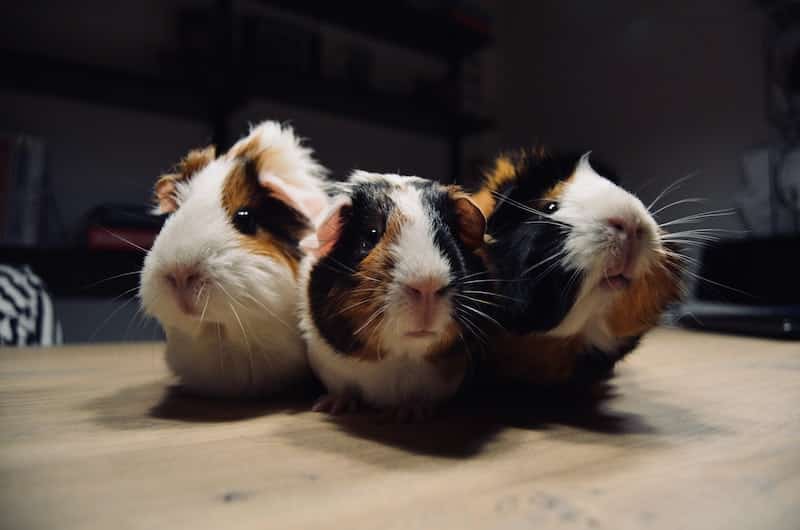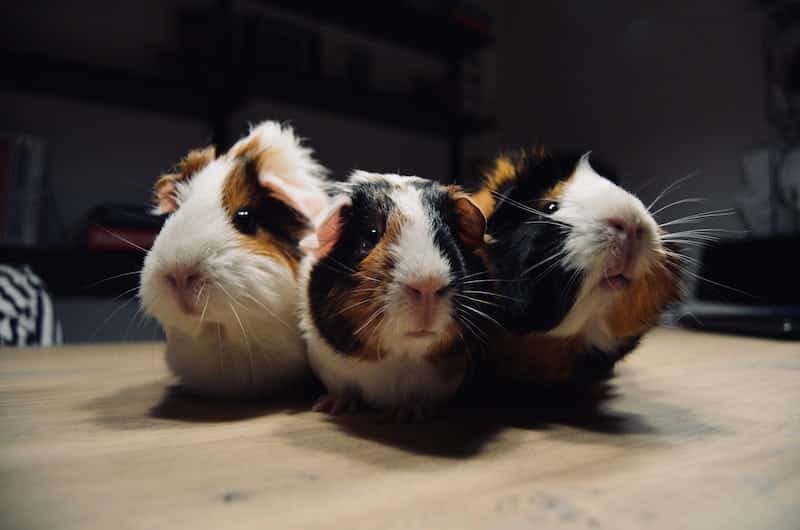People have all sorts of pets, with dogs, cats, and fish being the most common. Some people enjoy their pets of the avian or reptilian variety. Then there are the owners of small pets such as mice, hamsters, and rabbits. There is another popular pet that attracts the attention of many fans of small pets. The guinea pig has its own set of challenges, but if your family is adaptable to the animal’s needs, a guinea pig can be a delightful pet to have in the house.
Many families who take in a guinea pig are pleased with this easy-going pet as their new family member, but it’s only fair to point out that there are some considerations to be made before choosing to own a guinea pig.
Let’s take a look at some of the pros and cons of owning a guinea pig for a pet.

Reasons You Should Own a Guinea Pig
1.) Gentleness: Guinea pigs are very gentle creatures, rarely bite, and stay calm in familiar surroundings given things to keep them occupied. Many other small pets do not like being taken out of their cages, but a guinea pig used to its owners loves to come out, roam around, and be handled. They are also great with other guinea pigs that may live in the house and are happy to share the living space in most situations.
2.) Adaptability: Guinea pigs are adaptable to their surroundings and do so pretty quickly. That makes the initial adjustment period of the guinea pig getting used to their new home a relatively straightforward process.
3.) Cuteness: There is no doubting the cuteness of the guinea pig. These creatures are adorable to look at, and their attractiveness doesn’t wither with their age.
4.) Great Pets For Kids: Because of the guinea pig’s calm demeanor, they make an excellent pet for children. They are not aggressive and love gentle human touches. This makes them widely considered to be an ideal first pet for a child to have.
5.) Low Upfront Costs: Purchasing a guinea pig is not an expensive venture. They typically cost between $30 and $40 per creature.
6.) Variety: There are so many different guinea pig appearances, that you can have your choice of a wide option range. Some are of a single color, while some have colored patches that cover their body. People have noticed that these patch combinations may be complementary to their personalities. Some guinea pigs have short hairs, while others are of a long hair variety.
7.) Clean: Guinea pigs are studious self maintainers and groom themselves religiously throughout the day. While you should clean their cage, you will rarely need to clean their body, short of the occasional brushing. The long-haired guinea pigs need the brushing a bit more frequently as their hair can get tangled, making it difficult for them to groom.
8.) Life Longevity: Unlike other small animals like mice and hamsters which have a lifespan of about 3 to 5 years, guinea pigs can live up to 8 years if properly cared for.
9.) Overall Health: Blessed with a great immune system, guinea pigs tend to be by and large a healthy animal, so the concern of the creature being ill is relatively minimal. That makes them low maintenance on the health front as there is not much reason to be concerned with needing medication and more than regular veterinarian care.
Why You Shouldn’t Own a Guinea Pig
1.) Require Ample Space: By comparison to other rodents, guinea pigs are one of the larger creatures, and while they often live in small cages in the pet store, that is far from an adequate space for what they need. A single guinea pig tends to require at least 7.5 square feet of space. If you have more than one, 15 square feet is the minimum that you should be considering. This can be a substantial amount of space, so it’s wise for owners to consider where they can have it in their homes.
2.) Costs Add Up: While the price of the guinea pig itself is not large, once you start adding in the cage, the food (which can run about $20 per month per guinea pig), and another $5 to $10 to purchase hay. Monthly, a guinea pig may cost up to $100 to live a happy, healthy life, not counting the purchase of their accommodations, bowls, water dispensers, or entertainment sources.
3.) Daily Care: If you are a guinea pig owner, remember that you’ll need to feed them daily. If you plan on leaving for a few days, you cannot simply leave a ton of food for the guinea pig to eat as it will not ration it per day. That will cause it to either get sick at first or starve later. If you plan to be away, make sure someone can take care of the guinea pig.
4.) Bad Smell: If the cage is not cleaned up on a semi-regular basis, it will start to smell bad. Some guinea pigs also use their excretions to mark their area, especially when living alongside other guinea pigs.
5.) Shy: Guinea pigs get used to their surroundings, but it takes them time to get used to their owners. Once they adjust, they will enjoy being tended to and handled, but that could take a substantial amount of time.
6.) Need Companionship: Can you keep just one guinea pig? Yes. Will they live a happy and fulfilling life alone? Unfortunately not. They need to be socialized with other guinea pigs. Companionship with their human friends will only go so far. They need creatures of their own kind to live with.
7.) Can Be Destructive: It is pertinent to provide the guinea pig with things to do to keep them entertained and for them to chew on. If you leave them to their own devices, they can be destructive when not provided with sufficient entertainment. This can be the case even inside of their cages.
8.) Vulnerable To Pests: While they have fantastic immunity to diseases, guinea pigs are susceptible to irritations caused by worms, mites, and other pests. If they suffer a bug bite, their immune system may not hold up against whatever was infection they acquired, and they will need quick medical attention.
9.) Males Can Be Aggressively Territorial: While they are generally calm, male guinea pigs have been known to get aggressive with other guinea pigs they reside with. Take care not to leave them in the cage together with others if they are acting out. The male will need to be separated, at least for a time, to calm any tensions.
- Tulip Mania – The Story of One of History’s Worst Financial Bubbles - May 15, 2022
- The True Story of Rapunzel - February 22, 2022
- The Blue Fugates: A Kentucky Family Born with Blue Skin - August 17, 2021
